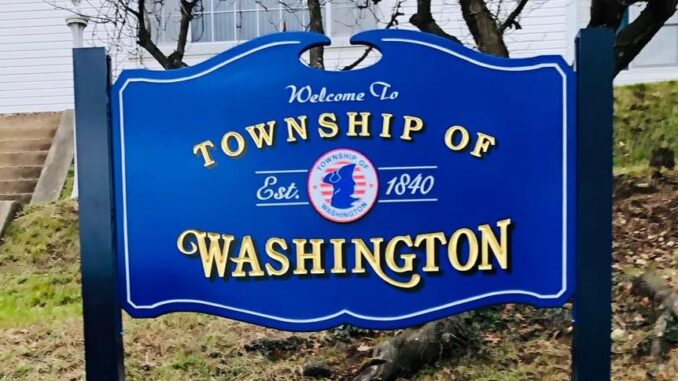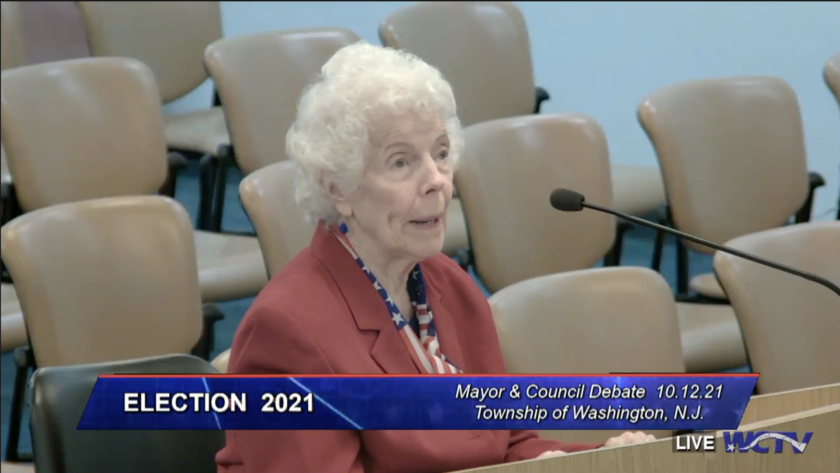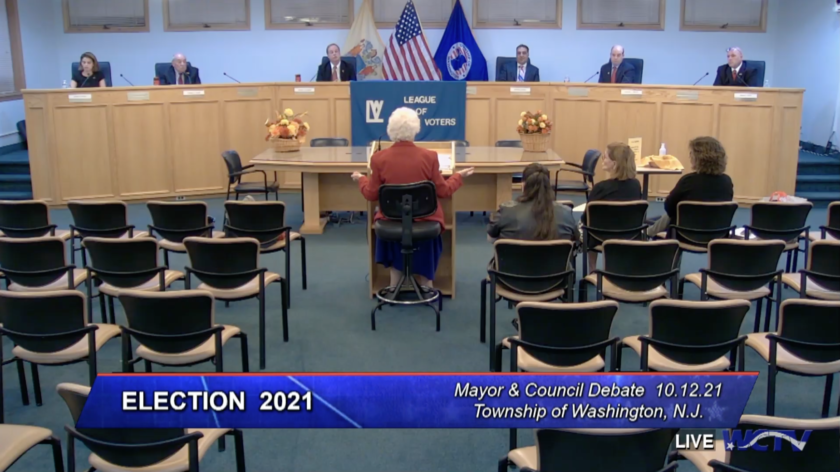
Pascack Press posted a version of this story in this space on Oct. 12 and revised it Oct. 14:
TOWNSHIP OF WASHINGTON—Residents had their say at the Oct. 12 candidates forum, signaling priorities and frustrations over land use, the budget, flooding, new development and its impacts, transparency, leaves, building permits, and the collection of trash and recycling.
Candidates are first-term incumbent Republican mayor Peter Calamari with running mates Councilman Thomas Sears and Public Affairs Director Daisy Velez, facing challengers Independent councilman and engineer Michael DeSena and running mates Fire Chief Kevin Zitko and financial planner Michael Werfel.
The mood at the dais was largely collegial. By night’s end veteran moderator Lucy Heller, co-president of the nonpartisan League of Women Voters of Northern Valley, had asked a baker’s dozen questions.
The session, running 8 to 9:30 p.m., was at council chambers, with WCTV-NJ televising and streaming live with the public not attending in person.
Residents sought details and insight on:
— The town’s interest in the residential property at 450 Pascack Road
Calamari said the town absolutely would use eminent domain to acquire it if it had to, and mused that it would be good land for an expansion of Memorial Field or parking, or a combination of both. “I believe that covers it,” he said.
DeSena said he would seek a conservation easement and retain the site’s hundreds of trees and perhaps use the land for affordable housing “or something else that would serve the residents.”
— The planned location of the DPW, now that contaminated soil at the former HQ has started to be excavated.
Calamari had posted hours earlier that this work had just begun, leaving DeSena to complain that the council remains out of the loop.
Sears said there is yet no good location found. Calamari disagreed that a horse farm they’ve been discussing is “necessarily” too small.
When Heller suggested residents keep following developments, Calamari agreed: “That’s a fair statement. Until we do groundbreaking all options are on the table.”
— The township’s use of bond anticipation notes, or BANS, to fund years of projects.
Werfel explained why he thought BANS fold in years of spending without transparency; Calamari suggested they were limited and prudent. “The key takeaway is that … we haven’t been transparent and upfront on our spending… We only went to BAN when we were almost out of money.”
Calamari: “We listen to our professionals” including bond counsel; “Private-sector accounting is not the same as municipal accounting.”
— Two priority issues for the town and how the candidates would address them if elected.

Here the candidates’ interests and strengths shone through, for example with Velez wanting to “make sure our community feels like they are part of a bigger picture,” and Sears, a veteran firefighter and member of the Green Team, calling for more trees and more investment in public safety.
Calamari said new families were asking for improvements in facilities and rec offerings.
DeSena also wanted to improve recreation, and asked why the town couldn’t produce a monthly rec newsletter “like our neighbor Westwood.”
He also expressed frustration with the Pascack Road–Washington Avenue intersection overhaul, which was the governing body’s first attempted ordinance under Calamari. “We still haven’t put a shovel in the ground.”
Zitko said, “Recreation in this town needs to be more than just sports.”
Werfel said there is “no open and transparent dialogue with Westwood — that’s a miss and I don’t know how you can say that’s a part of something you accomplished…”
— Nepotism and cronyism in hiring.
DeSena said the town has an employee conduct book, “which we do not follow.” He said he would review all bids and all qualifications “and make an informed judgment,” seeking “fresh faces and new faces… We don’t anticipate any nepotism or cronyism.”
Calamari, whose father and brother also serve the community, has heard the allegation before and wasn’t having it at the debate. He pointed out that he supported the town’s ordinance on nepotism and lauded his bother’s police work — noting that he took pains to distance himself from promotion talks.
Werfel said “We’ve had an attorney that’s double-billing for the same job… held over. We’ve continued to have one person in charge for 39 years… $3 million over his salary.” He said he looked into it and learned “He’s the only one we can complain to.”
Sears said, “We have loyal, dedicated people in the township. It doesn’t make them comfortable to hear we need new faces.” He said of town attorney Ken Poller, “There’s nothing hidden, I just want to make that clear.”
— How to mitigate flooding.
Calamari spoke of the Pascack Valley’s 10 mayors forming a river basin coalition; the mayors on Oct. 5 wrote the county to urge regional action.
Velez said, “Flooding and these new weather conditions… are new to many of us. We need to study and prepare for what’s going on…”
DeSena said there are many river basin coalitions in New Jersey and that “We have no stormwater study… I’ve dredged many rivers with the Mosquito Commission of Bergen County…Nobody from this town has requested dredging in the past 25 years.” He suggested cleaning inlets and adding drainage.
— Improving transparency and public engagement in governance, with some residents concerned that they’ve been cut off at the public microphone; and the town’s use of closed sessions, where closed session minutes have not been released.
Werfel said “Some of the best ideas come from residents. They can know more than we do on any given subject.”
DeSena said “A lot of times closed sessions are required. We use it a lot and it doesn’t give the residents a lot of transparency and good will. We’re skirting the law there.” He said Poller had not given him closed session minutes to make public.
Zitko called for adding online surveys and forums.
Calamari said, “Closed sessions are a necessary evil. We’re getting a lot of projects done. But at the end… the council must vote in public.”
Sears said, “We do have to have closed sessions. We have a lot of COAH projects going on. There’s nothing that is absolutely being hidden.”
— A dog park.
Sears said, “We were looking at Sherry Field. We had an engineering study, and are waiting to finish the process.”
Calamari said, “We received a grant for the dog park… We were considering the swim club property … we are actively looking to see which park and field would suit it best.”
DeSena said a dog park has been on the agenda for three years … “We should have had a location if not funding. I’m all in favor. I don’t think it’s going to happen anytime soon.”
— Where the town will store leaves this year.
The leaves are going out of town.
— A better (public) deal on garbage and recycling pickup.
Calamari said “This is something we are currently looking at.”
DeSena attacked the administration’s work on this to date, saying in part that the town lacks “a true CFO,” and that “I’m glad you agree we need to look into this… right before the election.”
Calamari: “I am so tired of ‘election year politics.’ Nothing I do is for an election. If you have evidence of that bring it forward.”
— Solutions to complaints of trouble obtaining building permits.
— New development and projected impacts on traffic and services.
— How the town can put its pandemic relief funds to work.
Heller noted the Nov. 2 ballot includes two state questions, and urged viewers also note the school board race.
The debate is being rebroadcast every two hours from 8 a.m. to 10 p.m. WCTV airs on FiOS Channel 24 and Optimum Channel 77 in Westwood and the Township of Washington. We’re a the debate as stories.

